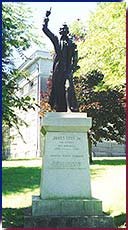Built
circa 1754 on Olde King's Highway, the Crocker Tavern served
as a stage coach stop, an inn, and important meeting place
into the mid 1800s. Cornelius Crocker, one of the wealthiest
men in Barnstable Parish, was the first keeper of the
Tavern.  According to signed documents from the Barnstable
Historical Commission, the activities that took place at the
Crocker Tavern were "... instrumental in changing the
boundaries of America, taking Canada from the French, and
then helping to remove this country from England's dominance. Here is an actual structure which was once filled with
our Colonial ancestors - lawyers, judges, farmers,
merchants, mariners, Indians, slaves, men of honor and
wealth and those of lesser means - all contributing to our
heritage." According to signed documents from the Barnstable
Historical Commission, the activities that took place at the
Crocker Tavern were "... instrumental in changing the
boundaries of America, taking Canada from the French, and
then helping to remove this country from England's dominance. Here is an actual structure which was once filled with
our Colonial ancestors - lawyers, judges, farmers,
merchants, mariners, Indians, slaves, men of honor and
wealth and those of lesser means - all contributing to our
heritage."
 Under the
stewardship of Cornelius Crocker, the inn became the meeting
place for the Whigs (the Patriots) prior to, and during, the
Revolutionary War. At the same time the Tories (the
Loyalists) gathered less than 100 yards to the west on Olde
Kings Highway at the Loring Tavern. The Whigs were led by
James Otis, Jr., and 22 others including the Crockers, the
Lothrops, and John Davis. The Whigs who met at Crocker
Tavern waged a courageous and uphill struggle because the
moderates of Barnstable Village sympathized and sided with
the Tories. On the other hand Barnstable was at the front of
Whig activity for the entire Cape. In order to align
Barnstable and all of the Cape villages in support of the
patriotic cause, James Otis, Jr., the Crockers, and the
other Whig leaders created a County Committee with regional
representation. The purpose of this Committee, which
convened at the Crocker Tavern, was in Otis' own words
"to meet and consult what is most proper to be done in
this day of difficulty." Under the
stewardship of Cornelius Crocker, the inn became the meeting
place for the Whigs (the Patriots) prior to, and during, the
Revolutionary War. At the same time the Tories (the
Loyalists) gathered less than 100 yards to the west on Olde
Kings Highway at the Loring Tavern. The Whigs were led by
James Otis, Jr., and 22 others including the Crockers, the
Lothrops, and John Davis. The Whigs who met at Crocker
Tavern waged a courageous and uphill struggle because the
moderates of Barnstable Village sympathized and sided with
the Tories. On the other hand Barnstable was at the front of
Whig activity for the entire Cape. In order to align
Barnstable and all of the Cape villages in support of the
patriotic cause, James Otis, Jr., the Crockers, and the
other Whig leaders created a County Committee with regional
representation. The purpose of this Committee, which
convened at the Crocker Tavern, was in Otis' own words
"to meet and consult what is most proper to be done in
this day of difficulty."
After the
Declaration of Independence, Barnstable and the other towns
of the Cape reluctantly joined the ranks of the rebels.
Nonetheless the patriotic campaign spearheaded at the
Crocker Tavern had succeeded. As a result, it was
historically symbolic and appropriate that the Cape militia
gathered in front of the Crocker Tavern and across the
street at Rendevous Lane before marching to Lexington and
Concord to
fight for American independence.
 Thus, the
Crocker Tavern is not only a local, but also a national
historic landmark particularly because of the role fulfilled
by James Otis, Jr. prior to, and during, the American
Revolution. Otis was a revolutionary leader for Barnstable,
for the Cape, for the Massachusetts Bay Colony, and for all
thirteen colonies. Samuel Adams regarded Otis as more
effective and more important to the patriotic cause than
Patrick Henry. President John Adams, in fact, said of Otis'
Writs of Assistance Speech in February, 1761, "American
independence was then and there born." Thus, the
Crocker Tavern is not only a local, but also a national
historic landmark particularly because of the role fulfilled
by James Otis, Jr. prior to, and during, the American
Revolution. Otis was a revolutionary leader for Barnstable,
for the Cape, for the Massachusetts Bay Colony, and for all
thirteen colonies. Samuel Adams regarded Otis as more
effective and more important to the patriotic cause than
Patrick Henry. President John Adams, in fact, said of Otis'
Writs of Assistance Speech in February, 1761, "American
independence was then and there born."
The
meticulous restoration and careful preservation of the
Tavern stirs the imagination of what transpired at this
site during the Colonial period and the revolutionary epoch,
as well as throughout our own national history. Those who
rent the Tavern have an opportunity to indulge their
curiosity and appreciation for our national heritage and the
birth of American liberty. The Crocker Tavern is Cape Cod's
authentic "Cradle of American Liberty."

|

![]()
